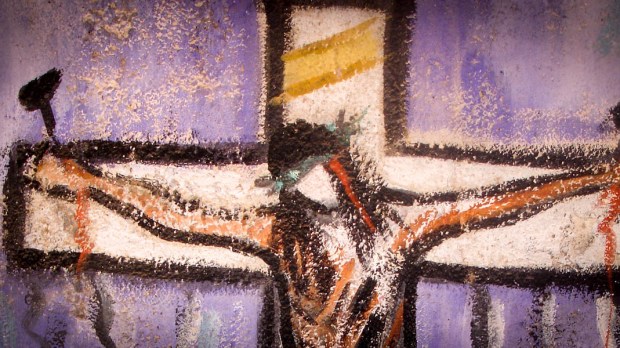There’s good news and bad news today. The good news: Winter is almost over! Is the bad news Lent has just begun?
For those of us who have been locked in ice, gripped by winter’s storms, the passage of the cold and the emergence of spring is a welcome transition. But what about Lent? Should Lent be welcomed? Should we run toward or from the long vigils and longer fasts, toward or from the crosses and losses of Lent? Don’t rush to the obvious answer.
I think we’re more likely to find an honest answer to the question, “Should we welcome Lent—or simply endure it?” if we ask a prior question: “Do you think you need a divine savior, or can you save yourself?”
If we’re honest, we’ll admit that even as we might welcome the melting of winter’s ice, there may still be ice water in our veins, and a hardness of heart that could put any iceberg to shame. And if we’re really honest, we might even admit that we need not just another Lent, but a startling, shocking, shattering Lent. The kind of Lent that I think we need is well illustrated by a poem that we study whenever I teach rhetoric:
Good Friday By Christina Rossetti (1830–1894) Am I a stone and not a sheep That I can stand, O Christ, beneath Thy Cross, To number drop by drop Thy Blood’s slow loss, And yet not weep? Not so those women loved Who with exceeding grief lamented Thee; Not so fallen Peter weeping bitterly; Not so the thief was moved; Not so the Sun and Moon Which hid their faces in a starless sky, A horror of great darkness at broad noon— I, only I. Yet give not o’er, But seek Thy sheep, true Shepherd of the flock; Greater than Moses, turn and look once more And smite a rock.
Rossetti, in each stanza, forces us to look at ourselves and then to look at Christ crucified. We’re tempted to tell ourselves, especially on Palm Sunday, Good Friday, while praying the Sorrowful Mysteries of the Rosary or meditating on the Stations of the Cross, that had we been there, we would have stayed with Jesus, wept for him, and comforted him and his sorrowful mother. We tell ourselves that, but, in our better moments, can we believe it?
Rossetti asks herself, “Am I a stone and not a sheep …?” A good sheep hears and knows and follows the voice of the shepherd. A stone hears and knows and does nothing. Have we ever been deaf or, worse—indifferent—to the voice of the shepherd? Has grace ever been poured out upon us, only to be received like water falling upon a stone?
The poet clearly knew Sacred Scripture, and, very likely, was more familiar with great Christian artistry than we are today. What she wrote demonstrated that she drank in with all the powers of her soul the account of those who betrayed and ran from Jesus; the account of those few who stayed with him at the foot of the cross; the account of Peter, who betrayed, repented and wept bitterly; the account of Judas, who betrayed and yielded to despair.
Do we know Scripture (and good Christian art, literature and music) so well that we have lived with and through all those responses to Christ crucified as Rossetti did? Do we know ourselves so well that we can say with confidence which role—faithful, repentant or despairing—best suits us? Rossetti clearly knows herself well, and so she writes: “… turn and look once more … and smite a rock.”
The disciplines of Lent—not the tepid “give-ups” nor the wishful thinking masquerading as “Lenten resolutions”—but the true disciplines of prayer, fasting and almsgiving — are meant to lay bare the hardness of the human heart in the hopes that the divine savior (who is the only kind of savior worth having) will break through and do for us what we cannot do for ourselves. We fallen and stubborn humans do need a divine savior, and Lent is an annual reminder that we don’t have to die in our sins.
Yes, the waning of winter is welcome news, good news. The beginning of Lent is great news—it is a time when our crucified and risen savior draws near to us, and asks us to follow in his way, following him to Calvary, to the tomb, to resurrection and to glory.
And here we would do well to remember the words of Saint Paul: “Trustworthy is the saying: For if we have died together with Him, we will also live together with Him.” (2 Timothy 2:11)
When I write next, I will offer a reflection on another poem for Lent. Until then, let’s keep each other in prayer.

